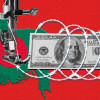A cloudy business sky over Bangladesh

The business sky over Bangladesh looks dark and heavy, just like the monsoon days in July. There is growing fear and worry across the country as the United States has announced a 35 percent tariff on Bangladesh's ready-made garment (RMG) exports, on top of the existing 16 percent tariff. The new tariff will start from August 1, and many people are calling it a "nightmare" for the economy.
As members of the business community, we hope the government truly understands how serious this is. This is not only about some garment factories shutting down. The real problem is much bigger. If not handled properly, this tariff could badly damage the entire economic structure of the country.
We have faced hard times before—during the end of the Multi-Fibre Arrangement (MFA) and even during the COVID-19 crisis. In those times, the government and private sector worked together. With teamwork, we overcame those challenges and came back stronger.
Today, we need the same kind of unity, planning, and quick action.
This issue does not only affect the garment sector. It affects the entire national economy, because garments account for around 85 percent of Bangladesh's total exports. The USA is our single largest export destination, and no other country can replace the US market overnight. That's why we must act wisely and quickly.
The US Tariff and Global Trade Changes
The Trump administration is trying to reduce America's trade deficit ($800 billion) and fiscal deficit ($1.83 trillion) by increasing tariffs on imports. So, the 35 percent tariff on Bangladeshi garments is not just about Bangladesh—it's part of a much bigger plan. And it's unlikely the US will cancel it anytime soon. So, we need to prepare a smart strategy to handle it.
At the same time, US apparel demand is shifting. For example, in May 2025, the US imported $556 million worth of garments from China, compared to $1.47 billion in January 2024.
As China's exports drop, many US companies are moving their production to Southeast Asian countries.
In 2025, US apparel imports from Cambodia increased by 14.44 percent, Pakistan by 7.28 percent, and India and Vietnam by over 5 percent. This shows a clear shift away from China.
Bangladesh has a great opportunity to capture this market, thanks to our large capacity, strong compliance, and competitive costs.
Rising Competition
A Reuters report published on May 9 stated that Walmart, one of the largest US buyers of Bangladeshi garments (over $1 billion annually), is now exploring India for sourcing. However, India faces many challenges such as lack of skilled labour, higher costs, and smaller factory capacity.
Vietnam—despite having the highest labour cost ($170–$200) compared to Bangladesh ($113–$115) and India ($150–$190)—is also becoming a strong competitor. Vietnam is receiving large Chinese investments to build infrastructure, which is helping them grow fast.
While Vietnam is a strong player, Bangladesh still holds a competitive edge, but we must act before the opportunity slips away.
What Needs to Be Done
This is not just about tariffs. The US is also demanding zero-duty access for its exports, like cotton, soybeans, and wheat. There is a chance to negotiate a fair trade deal where both countries benefit.
To solve the issue of value addition rules and non-tariff barriers, Bangladesh should ask for a 3- to 5-year transition period. Changing sourcing and production strategies takes time. Such a transition period will help both sides adjust without causing sudden disruption.
But we should not expect that only talks between statesmen will solve this problem. This is part of a bigger US trade policy connected to its national debt and competition with China. That's why the solution must be smart, practical, and focused on long-term benefit.
We strongly urge the Bangladeshi government to involve all key players—business leaders, financial institutions, factory owners, and worker representatives—to build a joint action plan and begin discussions with the US side.
A Message to Our Commerce Adviser
To our Honourable Commerce Advisor—this is a turning point for our nation. As a second-
generation business leader, your actions now will have a long-term impact. If you can help solve this crisis, it will be a great success and a proud legacy for you and the country.
Let's not wait—to witness the nightmare become real.
The writer is the managing director of Cloths "R" Us Ltd, an elected board member of the Bangladesh Buying House Association and a recipient of the DHL-The Daily Star Business Award 2024 in the "Outstanding Woman in Business" category.

 For all latest news, follow The Daily Star's Google News channel.
For all latest news, follow The Daily Star's Google News channel. 








Comments